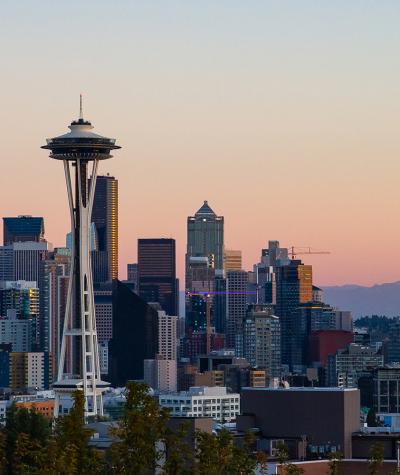On May 14, 2019, the Washington Supreme Court will hear oral arguments in Elster v. City of Seattle, a case challenging the constitutionality of Seattle’s innovative public financing system for local elections—the Democracy Voucher Program.
The plaintiffs in Elster are property owners in Seattle who contend the city is forcing them to subsidize the political speech of candidates in the voucher program whom they may not support.
In November 2017, a trial court rejected this argument and dismissed the plaintiffs’ challenge, ruling that Seattle’s program was a constitutional method for the city to expand “voter participation in the electoral process.” Now, on appeal to the state supreme court, the plaintiffs are again claiming that Seattle has unconstitutionally compelled them to fund the speech of candidates in the program.
Over 60% of Seattle voters approved the creation of the Democracy Voucher Program as part of a 2015 ballot initiative known as “Honest Elections Seattle.” Under its first-in-the-nation program, Seattle provides eligible city residents with $100 in Democracy Vouchers to assign, in $25 increments, to qualified local candidates of their choosing.
To receive voucher funds, candidates for city office must raise a number of qualifying contributions, agree to participate in public debates for both the primary and general elections, and adhere to special rules on fundraising and spending throughout their campaigns. To fund the program, Seattle imposes a modest tax on property in the city that costs the average Seattle homeowner about $8.00 per year.
Over 40 years ago, in Buckley v. Valeo, the U.S. Supreme Court upheld federal law’s public financing system for presidential candidates, while rejecting many of the same arguments put forth by the Elster plaintiffs.
In Buckley, the Supreme Court compared public financing of elections to “any other appropriation from the general revenue,” explaining that the presidential program did not violate the Constitution simply because it “uses public money in a manner to which some taxpayers object.”
Moreover, the Buckley Court stressed that public financing, rather than infringing political speech, works to “facilitate and enlarge public discussion and participation in the electoral process, goals vital to a self-governing people.”
These same goals animated Seattle voters’ decision to adopt the Democracy Voucher Program in 2015, and, over the course of a single election, the program has ably demonstrated its capacity to broaden political engagement among a larger and more representative portion of the city’s electorate.
During Seattle’s 2017 election, the first in which candidates were eligible to receive Democracy Vouchers, Seattle residents’ participation in local campaigns reached historic highs.
According to the University of Washington’s Center for Studies in Ecology & Demography, 20,727 Seattleites used their Democracy Vouchers to contribute to local candidates in 2017, representing more than a 250% increase over the number of city residents who made a campaign contribution during the city’s 2013 election, before the program’s enactment.
Beyond increasing the number of Seattle residents who contributed to local campaigns, the program also diversified the composition of the city’s campaign donor population.
Compared to individuals who gave a cash contribution to city candidates in 2017, the CSDE found that Seattle residents who used Democracy Vouchers were more likely to be low-to-middle income and to reside in the city’s poorest neighborhoods.
Likewise, the population of voucher donors contained higher shares of minority groups and residents under the age of 30 than the cash contributor pool.
In another assessment of Seattle’s program, Every Voice and the Win/Win Network found that 84% of contributors in Seattle’s 2017 election were first-time donors to city campaigns, and that 71% of these new donors used Democracy Vouchers.
Participation in the voucher program also correlated with sustained engagement throughout the electoral process.
The CSDE reported that almost 90% of Seattle’s voucher users voted, while only 43% of city residents who did not use vouchers cast a vote in 2017. Impressively, the improved levels of voter turnout held even after controlling for residents’ voting histories: among Seattle residents who had voted in less than half of the prior elections in which they were eligible, voucher users were still four times more likely to vote than city residents who did not use their vouchers.
Seattle’s voucher program has also changed how city candidates raise campaign funds.
In their post-election review of the program, Every Voice and Win/Win found that during Seattle’s 2013 election, prior to the program’s enactment, small donations of $250 or less accounted for 48% of city candidates’ total fundraising haul. By comparison, 87% of city candidates’ funding in 2017 came from Democracy Vouchers and donations of $250 or less.
While the 2017 city election was predominantly funded by vouchers and small donations, candidates in the program remained competitive. All of the 2017 city races in which candidates were eligible for Democracy Vouchers were won by program participants, and Teresa Mosqueda, a Latina who was a first-time candidate in 2017, has praised the program for helping her to win a seat on city council.
Despite the Democracy Voucher Program’s positive results in 2017, the plaintiffs in Elster are seeking to end Seattle’s program after just one election. Moreover, if successful, the plaintiffs’ arguments could handicap other jurisdictions’ ability to enact this innovative type of public financing for state and local elections in the future.
The Washington Supreme Court should reject this misguided attack, and preserve Democracy Vouchers as a tool to advance the Constitution’s promise of meaningful self-government by all citizens in our democracy.
